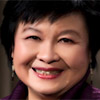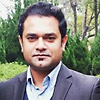To Change the Future, We’ll Team Up - Globally!
by Mei Lin Fung, People Centered Internet and Karen McCabe, IEEE
IEEE Internet Initiative eNewsletter, September 2016
A report on the Science and Technology Side event at the United Nations on June 6, 2016: Connecting the next Billion
In April 2016, the IEEE and the World Bank held a standing room only, interactive event where stakeholders explored real-world solutions to extend affordable and meaningful Internet access in underdeveloped and underserved communities. This report provided the basis of dialog at the United Nations during the Science, Technology and Innovation Forum, on June 6, 2016, where participants anticipated challenges, identified promising opportunities, and discussed how to team up to advance the goal of connecting the unconnected in a meaningful manner to achieve the Sustainable Development Goals (SDGs).
At the UN Science and Technology Forum for the SDG’s, diverse groups uncovered how we could team up, and our findings are summarized below.
|
Anticipated challenges |
Promising Opportunities |
Insights on paths forward: Who? What? |
|
Lack of access points In remote areas |
-Free public Wi-Fi access -Create job opportunities in rural areas through connectivity |
-Continue with "appropriate" policy that enables access. -Leverage Schools & libraries for connectivity |
|
Political (policy, regulation) |
-Private public partnerships to extend & optimize resources and knowledge -Deploy technology for digital transformation in the government and in the countries |
-Regulatory framework involving partnerships by multi stakeholders - community, global, stakeholders, top level government. -Partner with technology corporations and technology community (IEEE, ISOC) to engage and be involved. |
|
Relevant local content |
Engage local community to build local capability and local leadership in applying Internet technology |
-Involve people & community in planning & operationalizing - Together: Global & local leaders, grass roots |
|
Cultural barriers |
Bringing women online as tech producers and consumers |
-Partner with groups focused on women and families to learn to integrate local context |
|
Trust by people in governments and initiatives related to technology and the internet: |
- Broadband access provides transparency to grow trust in government. - Engage local people to be part of identifying and designing programs so they grow sense of ownership |
-Educate government decision makers -Create structure in governments when there are direct "lines" or channels of communication on issues - Create opportunities for government officers to gain recognition for benefiting people |
|
Lack of digital literacy |
- Education programs from an early age (digital literacy & its usefulness) |
-Education on access on many levels. - Connect every class room |
|
Challenging to private sector players |
-Private sector involvement so they have valuable roles to play |
-Investment from banks, private investors -Private service providers (see Bulgaria story) |
|
"Cyber Hygiene" Security, Privacy Ethics |
-Local, Global Dialogue - Embracing diversity |
-Work on all tracks in parallel: health, social services, education, security. -Partner with global local players to create direct experiences with diversity |
|
Infrastructure (limited, lack of, cost) |
-Collaborate and link efforts to make available critical resources like electricity -engage global and local networks to reduce costs and risk |
- Create competition - foster better services & prices by well framed marketplaces |
Key Insights
Trust: "Why should we care?" turned out to be a crucial question, because those with expertise often assume that others care about the same thing they care about or have the same perspective. But often this is not the case, until they know how much you care and why.
New face of leaders: Women and children are previously often overlooked when it comes to local leadership. One promising opportunity is understanding the family situation, so that children can be “knowledge transmitters” to bring home their understanding of the Internet and share it with their parents or caregivers. To achieve it, we need to create resources that are deeply relevant to the local community, culture, economy, and society. Investing in local content is also a high-return activity because it activates one of the most important yet neglected assets in all countries, rich or poor: women. By providing easy access to the Internet in public spaces and especially in schools, women leaders have the opportunity to develop economic skills for themselves and their children which increase the possible avenues for improving the lives of people in their communities.
Culture change: The Internet provides promising opportunities yet in order to reap advantages from these opportunities, local technical and cultural expertise needs to be developed, especially in rural areas. Programs are required to increase cultural understanding between different divides - generational, national, ethnic, and religious. The Internet decreases distance and lowers boundaries which have stood for millennia, so we must anticipate resistance and engage ordinary people in planning and operationalizing the introduction of the Internet into their communities. Public libraries and schools need to be at the frontiers of change.
Competition, New Business Models: A sense of opportunity and the promise of a better future can bring many people to the table to provide desired goods and services The Bulgarians model helped bring down prices and raised the quality of services.
Teaming Together is Our Best Shot for Success
We have the opportunity to team together to create real progress on the Sustainable Development Goals by leveraging the power of the Internet. At the meetings described above, a diverse group of stakeholders engaged and together made valuable progress. But we need to build on our insights and recommendations for solutions. Our next step is to take stock of the global and local initiatives underway - and to begin to take practical action together.
Vint Cerf, one of the fathers of the Internet, is bringing together people in initiatives under the umbrella of the People-Centered Internet, to discuss what it means to apply our most valuable technology tool to improve people’s lives. According to Cerf, these initiatives
-
provide incentive to realize the benefits the Internet can offer, in practical ways.
-
will teach us whether our ideas are practical in the field, and where they are not. We will have the opportunity to refine our efforts towards achieving positive outcomes.
-
provide examples to others and encourage them to consider possibilities for Internet implementation elsewhere.
-
if successful, will generate the potential for sponsorship, funding and support in other locations and through other agencies and groups beyond those already engaged.
-
contributes to achieving the UN SDG’s that are so ambitious in scope.
-
reinforce and make more useful efforts such as the Global Connect Initiative announced by the US State Department and the series of bi-annual gatherings brought together by the IEEE-World Bank “Global Connect Stakeholders: Advancing Solutions” series of meetings through 2020
The next meeting will be held Oct 5-6 2016 at the Omni Hotel in Washington DC to continue our global team up to meet the challenge of our generation: Connecting the UnConnected. IEEE, in collaboration with ISOC, People Centered Internet and World Bank, will be hosting its second event dedicated to advancing solutions for internet inclusion. Building upon the 13 April 2016 Global Connect Stakeholder: Advancing Solutions meeting and subsequent developments in connecting the unconnected projects and dialogue, it will convene government officials and leaders from development banks, industry, the technical community, NGOs/CSOs and others in working sessions to help accelerate the work being done by both public and private sectors to hasten inclusive internet connectivity.
For more on this see Internet Inclusion: Advancing Solutions in Washington, D.C.
 Mei Lin Fung
Mei Lin Fung
Mei Lin Fung is the organizer for the People Centered Internet, which she co-founded with Vint Cerf, one of the fathers of the Internet. For over 30 years in Silicon Valley she has been a wife and mother and was an early pioneer of Customer Relationship Management (CRM), now a US $27 billion industry. CRM started as a skunkworks project, OASIS, championed by Tom Siebel and nurtured by Marc Benioff, who later left Oracle to found SalesForce. Living in Stanford, she worked at Intel and Oracle during the rise of Silicon Valley.
As a Singaporean she has seen unprecedented economic growth where a third-world country increased GDP per capita over 50 years to over 20% higher than the US. She served on the US Defense Health Futures project from 2009-2013. She has been a board member of the National University of Singapore America Foundation since 2007. She co-founded Program for the Future and is the founding unit coordinator of the California Health Medical Reserve Corps.
 Karen McCabe
Karen McCabe
Karen McCabe is a Senior Director of Technology Policy and International Affairs at IEEE, where she leads efforts to build and connect communities working in the technology policy ecosystem and where her focus is on the development and promotion of collaborative strategies that produce impactful outcomes among multi-stakeholders to help advance technology for society and humanity’s benefit.
During the last 20 years, Karen has held various leadership and senior management positions in the technology sector, with a specific focus in the global standards and technology development domain that is rooted in openness, transparency and inclusiveness. After graduating from Kean University with a degree in communications, Karen initiated her career working in the engineering and technology space as a communications professional.
Today, Karen in engaged in efforts in Internet governance, ethics, and technology and global standards in trade and policy. She leads IEEE’s engagement with the UN and other international bodies with a focus on engagement of technical community and a focus on the intersection of policy and technology in ICTs. Karen is a member of the OECD Internet Technical Advisory and the Internet Society. She works with an array of organizations and bodies to connect technologists, industry leaders, and policy makers, where she develops partnerships and builds alliances across stakeholder communities.
Editor:
 Dr. Ali Kashif Bashir
Dr. Ali Kashif Bashir
Dr. Ali Kashif Bashir is an academician, an entrepreneur, and a consultant. He received his Ph.D. in Computer Science and Engineering from Korea University, South Korea. He is currently working for Graduate School of Information Science and Technology, Osaka University. Here, he is working on projects of Nippon Telegram and Telephone (NTT), Japan and National Institute of Information and Communication Technology (NIC), Japan. He is also attached to National Institute of Technology, Nara, Japan as a Visiting Professor. Furthermore, he is serving few projects as a consultant. His previous assignments includes: Researcher, National Fusion Research Institute, South Korea; Mentor, Seoul Metropolitan Government; and Consultant, Korea Southern Power Co. Ltd, South Korea.
Dr. Ali is a senior member of IEEE and active member of ACM and IEICE. He has given several invited and keynote talks and is a reviewer of top journals and conferences. Furthermore, he is editorial board member of IEEE Access and Journal of Sensor Networks and Data Communications. His research interests includes: cloud computing (NFV/SDN), network virtualization, IoT, network security, wireless networks, etc. He is actively involved in ETAP working groups of IEEE Internet Initiative. He is also serving IEEE Internet Initiative eNewsletter as editor in chief.
Article Contributions Welcomed
If you wish to have an internet policy related article considered for publication, please contact the Managing Editor of Technology Policy and Ethics IEEE Future Directions Newsletter.
Past Issues
IEEE Internet Policy Newsletter Editorial Board
Dr. Ali Kashif Bashir, Interim Editor-in- Chief
Dr. Syed Hassan Ahmed
Dr. Mudassar Ahmad
Dr. Onur Alparslan
Dr. Muhammad Bilal
Dr. Syed Ahmad Chan Bukhari
Dr. Ankur Chattopadhyay
Dr. Junaid Chaudhry
Dr. Waleed Ejaz
Dr. Yasir Faheem
Dr. Prasun Ghosal
Dr. Tahir Hameed
Dr. Y. Sinan Hanay
Dr. Shagufta Henna
Dr. Fatima Hussain
Dr. Rasheed Hussain
Dr. Saman Iftikhar
Dr. Stephan Jones
Dr. Mohammad Saud Khan
Olga Kiconco
Dr. Jay Ramesh Merja
Dr. Mubashir Husain Rehmani
Dr. Hafiz Maher Ali Zeeshan
About: This newsletter features technical, policy, social, governmental, but not political commentary related to the internet. Its contents reflect the viewpoints of the authors and do not necessarily reflect the positions and views of IEEE. It is published by the IEEE Internet Initiative to enhance knowledge and promote discussion of the issues addressed.


